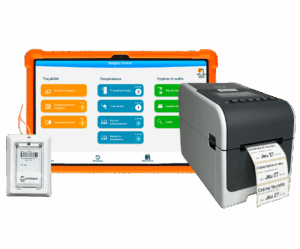Implement the HACCP method in your franchise restaurants
Launching Your Burger Franchise: How to Master Hygiene Across Your Restaurants?
In a burger franchise, mastering hygiene is essential!
If you want to expand your burger brand through franchising, here are some key tips to scale up successfully while ensuring HACCP compliance at your franchisees.
HACCP Principles to Ensure Hygiene in Your Burger Franchise
You already apply HACCP in your restaurant, but how do you ensure your franchisees do the same when you’re not always there?
First, define which HACCP checks must be done, ideally via your Sanitary Control Plan (PMS). If you don’t have one, start with the method below. Having a PMS is mandatory and a valuable asset when building your franchise.
Respecting HACCP helps avoid contamination risks, produce safe, quality products, and protect your brand image.
Priority HACCP Checks in Your Burger Franchise
Traceability and Burger Specifics
Traceability means tracking the journey of food products through production and processing. It’s mandatory for all products, but especially critical for higher-risk items like ground meat.
For each product, keep:
- Product name
- Batch number
- Best before/use-by date (DLC/DDM)
For multiple items with the same batch (e.g., vacuum-packed patties), one label copy is sufficient.
Ground beef has stricter regulations (see specific labeling rules):
- Origin (birth and farming country)
- Reference number/code
- Slaughter and grinding country
These details must appear on the health stamp or invoices.
Using Octopus HACCP to photograph and archive labels can simplify record-keeping.
Secondary Best Before Dates
Internal traceability is a quality guarantee for your burgers. Precise info on ingredients and their use-by dates helps reduce waste and limit sanitary risks.
Should all opened products be labeled? 🏷️
All cold-stored, opened, unpacked, or prepared products must be labeled with the opening/manufacture date and a secondary use-by date. Writing just the day with a marker is insufficient.
Typical secondary use-by times by category:
- Ground meat for burgers: 1 day (J+1)
- Fresh sliced cured/cooked meats: same day (J)
- Egg products: 1–2 days (J+1 or J+2)
- Homemade mayonnaise: same day (J)
Other homemade preparations (sauces, condiments) keep max 3 days unless tested microbiologically.
Storage Temperatures to Control Hygiene ❄️
Keeping burgers fresh means storing ingredients at correct temperatures to preserve taste and ensure food safety.
Regulations require transport, delivery, and storage at these core temps:
- -0 to +2 °C: refrigerated ground meat
- +4 °C: meat preparations and poultry
- +3 °C: prepared dishes made in advance
- -18 °C: frozen products
Check cold room temps daily before prep, using thermometers or laser devices. Record data on Octopus HACCP or use wireless sensors for automatic monitoring and alerts. Contact us to learn more!
Oil Control for Crispy Fries! 🍟
Fries are key to your brand’s taste. To keep quality consistent across your network, implement strict oil quality checks—also a regulatory requirement.
Heat breaks down oil molecules into polar compounds. French law (Decree 2008-184) bans oils with over 25% polar compounds as unfit for consumption.
Use test strips, degradation kits, or electronic testers to check oil quality.
If unavailable, visually and olfactively inspect: remove burnt bits, change oil if texture, color, smell, viscosity, or smoke changes.
To extend oil life:
- Filter oil after each service to remove burnt residues
- Control frying temperature to avoid overheating
- Dry fries well to reduce water that causes foaming and faster degradation
Unified Cleaning and Disinfection Plan for Your Franchise
A Cleaning and Disinfection Plan (PND) defines what, when, who, and how to clean and disinfect surfaces.
A common PND harmonizes cleaning frequency and products used across all restaurants—crucial in franchises.
Octopus HACCP helps you create and monitor PNDs easily.
Your PND should include:
- What: all elements to clean (e.g., fryer, hood, cutting boards, grills)
- When: cleaning frequency (after each use, daily, weekly…)
- Who: responsible persons for cleaning tasks
- How: procedures for each item
Standardizing Hygiene Procedures in Your Burger Franchise
Why set common rules across all restaurants?
Common rules ensure customers get a consistent experience and protect your brand.
Create HACCP hygiene procedures covering all established rules and include them in your mandatory PMS.
This standardizes documentation, facilitates team adherence, and provides clear instructions in case of issues. It helps control food safety and meet regulations.
When to perform HACCP checks?
Routine is key for HACCP success. Define exact times for checks to improve compliance. For example:
- Cold room temperature checks: at team arrival
- Traceability: during stock removal or after prep; collect packaging labels in a bin and photograph them before discarding
- Oil checks: end of day, after filtering
- Cleaning plan: after each service
How to save on hygiene products?
Often, each restaurant buys its own hygiene supplies, which may not be optimal.
Centralizing procurement for the whole network can yield economies of scale and ensure proper products are used correctly.
How to establish a PMS for Your Burger Franchise?
What is a PMS and why is it important?
The PMS (Sanitary Control Plan) is a regulatory-required document under the EU “hygiene package” (Regulations (EC) 178/2002, 852/2004, 853/2004) for all food businesses.
It is mandatory in franchising and must be specific to each restaurant (layout, kitchen, storage, ventilation differ).
You can create a common core PMS for shared production and quality control procedures.
Elements of the PMS for Your Restaurant Network
The PMS describes measures to ensure hygiene and safety against biological, physical, and chemical hazards.
It includes:
- Hygiene best practices: personnel, premises, temperature control, traceability, pest control, etc.
- HACCP method documents: process flowcharts, hazard analyses, corrective actions, list of critical control points (CCPs) and their monitoring.
Refer to sector-specific hygiene and HACCP guides to tailor your PMS.
While preparing your custom PMS, you can download the free HACCP guide for restaurant networks and franchises to familiarize yourself with the method.



